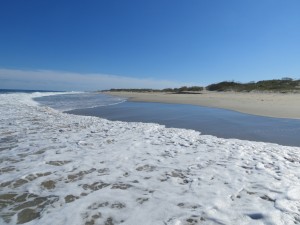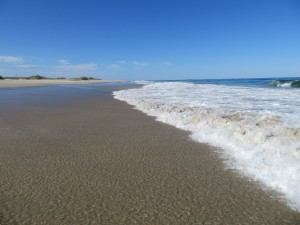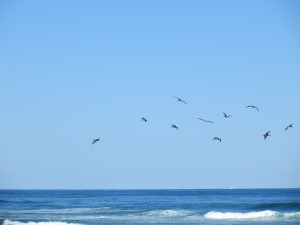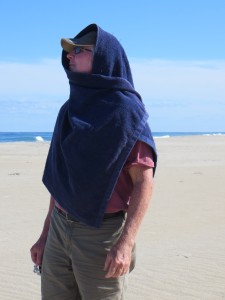 We pulled into deep sand and parked, left the car on the road and skidded over the dunes to the beach. On the edge of the surf, I looked north and south, to my left and right — no hotels, no houses rickety on stilts, no ships across the full scope of the horizon line, only an empty beach that stretched south for 70 more miles … no, a beach full of life and light, pelicans in flocks of 8, then 10, then more, skimming close to the waves, looking like some apparition from a primeval continent, one that rolled west through embryonic landscapes we can now only imagine based on fragments like this one.
We pulled into deep sand and parked, left the car on the road and skidded over the dunes to the beach. On the edge of the surf, I looked north and south, to my left and right — no hotels, no houses rickety on stilts, no ships across the full scope of the horizon line, only an empty beach that stretched south for 70 more miles … no, a beach full of life and light, pelicans in flocks of 8, then 10, then more, skimming close to the waves, looking like some apparition from a primeval continent, one that rolled west through embryonic landscapes we can now only imagine based on fragments like this one.
We walked next to the ebony blue water in burnished light, pausing to pick up shells. Trying to beat back the sun, I threw a towel over my head and shoulders. I have always wanted to imagine myself as T.E.Lawrence and sweeping across a dune, sweeping my towel around my head like a keffiyeh, I brought my wife to laughter — silly Lawrence followed by a dog who also thought me useless when I did not throw him a shell to chase. I love the release of this openness, of the presence of creatures unbound by us, of an emptiness filled to the brim with methamphetamine-shots of beauty, deeper than any breath I could take, deeper than my conscious mind — a feeling inside the bone. I could happily die in places like this if I could be certain that it would go on without me, the birds still flying, the sky settled in its infinite blue, life bursting out as if DNA percolated in the very surface of the earth.
over my head and shoulders. I have always wanted to imagine myself as T.E.Lawrence and sweeping across a dune, sweeping my towel around my head like a keffiyeh, I brought my wife to laughter — silly Lawrence followed by a dog who also thought me useless when I did not throw him a shell to chase. I love the release of this openness, of the presence of creatures unbound by us, of an emptiness filled to the brim with methamphetamine-shots of beauty, deeper than any breath I could take, deeper than my conscious mind — a feeling inside the bone. I could happily die in places like this if I could be certain that it would go on without me, the birds still flying, the sky settled in its infinite blue, life bursting out as if DNA percolated in the very surface of the earth.
 I have climbed a 12,000 foot peak into a thunderstorm, the hair on my arms rising in the static electricity alive in the air, all the planet under me, beating on and on, as alive as my heart. I have stood motionless in glades and watched warblers in crews scramble through the low limbs of trees and shrubs within the arena of my touch. With arms extended like a scarecrow, sunflowers in my hand, chickadees have landed on my palm. They paused there. I could feel their heartbeats through their feet. What would I have become without these pleasures, plucked up away from all the ephemera of everyday life in this machine age?
I have climbed a 12,000 foot peak into a thunderstorm, the hair on my arms rising in the static electricity alive in the air, all the planet under me, beating on and on, as alive as my heart. I have stood motionless in glades and watched warblers in crews scramble through the low limbs of trees and shrubs within the arena of my touch. With arms extended like a scarecrow, sunflowers in my hand, chickadees have landed on my palm. They paused there. I could feel their heartbeats through their feet. What would I have become without these pleasures, plucked up away from all the ephemera of everyday life in this machine age?
They are preparing to shoot wolves in Wyoming again. They are slaughtering elephants in Africa — 25,000 last year alone. Lions  are disappearing, tigers becoming ghosts. The wild creatures of the world are drifting toward the most sterile of myths, the ones we will have created. The wild places of the world are shrinking, eaten up by us for cities and farmland, for oil and all the precious metals, eaten by desertification and by malls, for parking lots and ever more highways. Nothing makes me more misanthropic. Nothing else brings me so close to despair. In my impotent rage I imagine an avenging, atavistic God sweeping his hand across our locust species and saying, “Enough. You too will follow them.” I do not think we can survive as humane without them or as altogether human.
are disappearing, tigers becoming ghosts. The wild creatures of the world are drifting toward the most sterile of myths, the ones we will have created. The wild places of the world are shrinking, eaten up by us for cities and farmland, for oil and all the precious metals, eaten by desertification and by malls, for parking lots and ever more highways. Nothing makes me more misanthropic. Nothing else brings me so close to despair. In my impotent rage I imagine an avenging, atavistic God sweeping his hand across our locust species and saying, “Enough. You too will follow them.” I do not think we can survive as humane without them or as altogether human.
I have spent time in a handful of wilderness specks, on foot, charged by a bull moose, confronted by bears at close range, stopped by rattlesnakes, watching peregrines and golden eagles diving and circling in overlapping spans away and up. I have seen wolves strike across a burn in Yellowstone, intent, indifferent to me. I have walked along a trail used by Grizzlies, every nerve ending alert, waiting…. What will the grandchildren of the students I taught see? Will even these specks and their beautiful uncertainties be gone?
In wild places I think we come closest to an unconscious dwelling in the present. Absorbed in moment-by-moment demands made by our bodies and by the terrain, we enter another state of being, one less narcissistic, more open-hearted, more alert to the full three dimensions of the space we live through. And when exalted animals enter that space, when light breaks apart in the foliage in shards, when we come upon an opening where we can rest our eyes on vistas of mountains, on unbroken plains, or on the sea, well, then we live as lucky monarchs, participants in realms we do not have to rule.